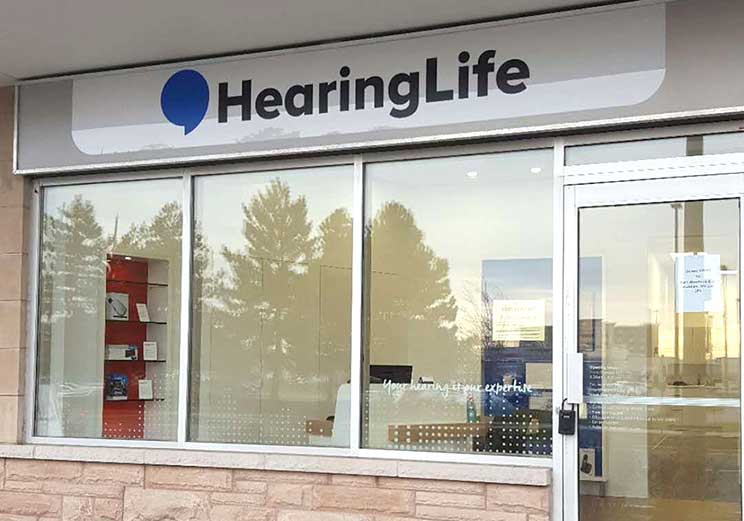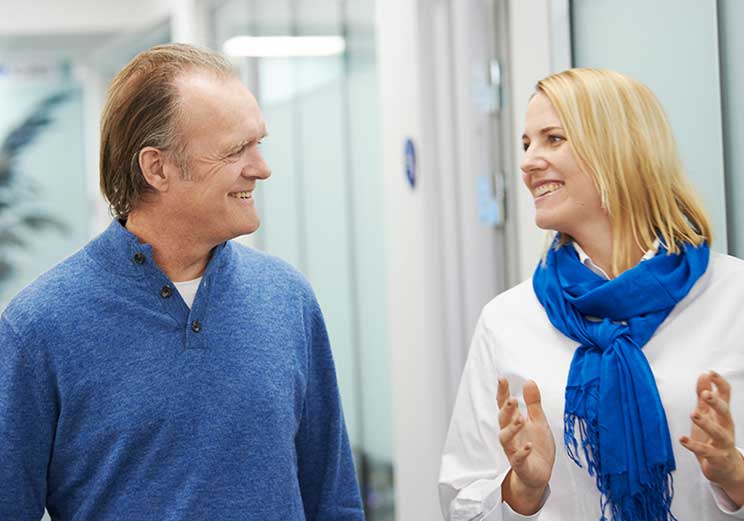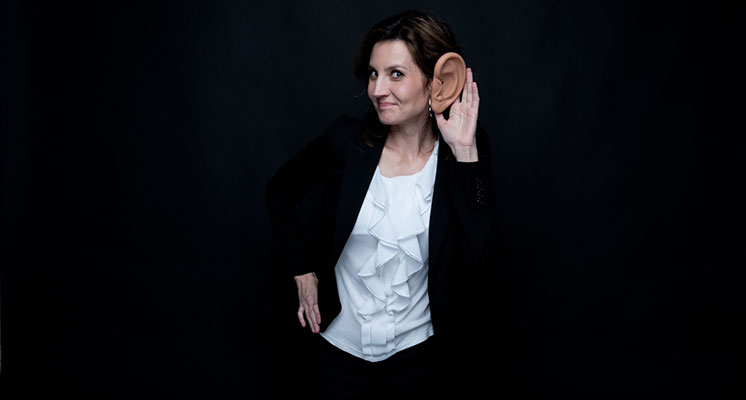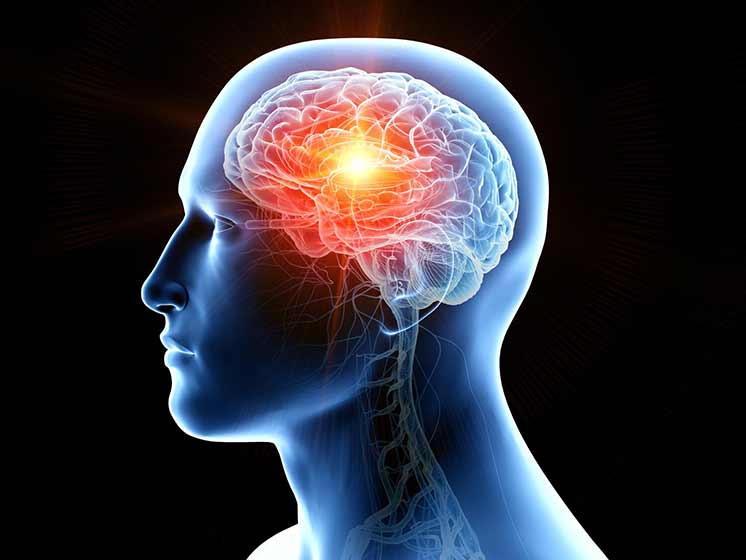Q: My eyes hurt after using my desktop computer for only a couple of hours. Should I get a bigger monitor? A: That might help, but there are a couple of more common causes of achy eyes related to computer usage. Insufficient blinking is a normal tendency when staring at screens, and that can cause dryness and irritation. Another problem is poorly focused vision, especially if you’re old enough to need reading glasses. Time for a checkup! Not only do we carry the latest fashions in eyewear, at Mosaic we’re here to help you with your overall eye health.
Hearing Aid Purchase Guide
Digital hearing aids are made up of a powerful minicomputer. The minicomputer analyses the sound environment from data gathered by the microphones. The computer selects the sounds you need help with. The highest quality and best hearing aids only amplify the parts of sound you need help with. They also remove any excess sound and amplify the personalized result in your ear.
The right hearing aid for you depends on several factors, including the type and severity of your hearing loss, your lifestyle, and your manual dexterity. However, a hearing aid that one person likes might not work for someone else, even if both have almost identical audiograms.
And even within the same brand, there can be several versions of a given model. That kind of variation makes comparing hearing aid models and brands very challenging.
When it comes to getting the hearing aids that suit your hearing needs this is what you should do

1. Find a hearing centre with licensed hearing professionals
When searching for a hearing care center, prioritize finding a location where a professional can assess your hearing and provide individualized counselling based on your specific needs. The centre should test your hearing in a soundproof booth and should give you a copy of the hearing test results. The provider should verify that the hearing aids are working effectively for you (including in a noisy environment). He or she should also review the instructional brochure that accompanies the hearing aids.
Connect with a hearing professional now

2. Find a convenient clinic location
Find a provider who has a local hearing center near home or work and is also part of a global network. This will give you access to a large network of hearing care providers. Professional help is never too far away. Your hearing aid provider should have convenient business hours, offer walk-in repair service, and make it easy to schedule an appointment.

3. Choose a provider that offers personalized, ongoing customer care
Your hearing is as unique as your fingerprint. Unlike standardized solutions, specialized hearing care centers allow you to build a relationship with your hearing care provider, and you will have the choice of a large spectrum of hearing aid types and brands so that you can find the optimal solution for you. The provider should discuss the effect of hearing loss on your lifestyle and relationships, and how best to manage difficult listening situations. The conversation should touch on the level of challenges you experience in hearing over the phone. The provider should ask about your manual dexterity and vision status because these can affect your ability to handle hearing aids successfully. The dispenser should also discuss realistic expectations and ask about your lifestyle, which can affect your choice of style and recommended features.
Find hearing centres with modern hearing technology
To learn more about hearing aids you can book a consultation with one of HearingLife’s 220+ clinic. Book your free HearingLife consultation here or call 1-833-384-2245
Clean Eating Recipe: Hot Chocolate
Store bought hot chocolate “packets” contain massive amounts of sugar and even hydrogenated oils (an unexpected, undesirable ingredient). You can serve this with whipped cream made of organic heavy cream with a little bit of Monk Fruit Sweetener.
1/3 c full fat coconut milk (unsweetened)
2/3 c boiling water
1 tbsp unsweetened cocoa powder
1 tsp vanilla
Monk Fruit Sweetener
(optional) 1-2 drops peppermint oil, whipped cream, or cocoa nibs
Boil water on the stove. Add in all remaining ingredients. Stir well. Let cool a little bit, serve and enjoy!
Breathe in a Sigh of Relief
Greentech Environmental’s PureHEPA+ Air Purifier emerges as a vital ally against the rising threat of wildfire smoke and persistent odors. Amidst increasing wildfire incidents, this eco-friendly air purifier offers respite, efficiently capturing harmful smoke particles with its HEPA filtration system. What sets it apart is its ability to eliminate odors using an activated carbon filter, ensuring your space always smells fresh. Beyond its performance, PureHEPA+ embodies eco-consciousness, consuming minimal energy and featuring durable construction to minimize waste. In an era where environmental responsibility is paramount, Greentech’s PureHEPA+ supports the relationship between technology and nature, providing a breath of fresh air for a sustainable future.
Exploring Creative Passions
Embracing creativity unlocks numerous benefits. It allows us to reconnect with past joys and explore fresh passions, fostering fulfillment. Creative activities, from art to games, offer mental and emotional rewards, granting purpose, combating isolation, and sharpening cognitive abilities. Moreover, creative pursuits foster connections, as you lead to participation in group activities. Such interactions alleviate loneliness and facilitate meaningful friendships. Age should never deter us from exploring our creative side as it nourishes our mental, emotional, and social well-being. Whether reviving old interests or embarking on new adventures, creative passions in your older years can be a gateway to newfound fulfillment.
Sore Gums?
If your gums hurt when you brush your teeth, it could be a sign of gum inflammation, commonly known as gingivitis. This condition is often caused by inadequate oral hygiene, allowing plaque to build up and irritate the gums. To address this issue, make sure to brush your teeth gently using a soft-bristle toothbrush. Contrary to popular belief, hard bristles don’t help you clean better, but will irritate your gums more. Ask our hygienists and they will all confirm, soft bristle is the way to go! Floss daily to remove food particles and plaque between teeth. Consider using an antiseptic mouthwash to reduce bacteria. If the pain persists or worsens, consult Uptown Dental promptly, as untreated gingivitis can progress to more severe gum disease. Regular dental check-ups are essential for maintaining oral health.
Book Club: Set Boundaries, Find Peace
A Guide to Reclaiming Yourself
By Nedra Glover Tawwab.
Healthy boundaries. We all know we should have them–in order to achieve work/life balance, cope with toxic people, and enjoy rewarding relationships with partners, friends, and family. But what do “healthy boundaries” really mean–and how can we successfully express our needs, say “no,” and be assertive without offending others? Licensed counselor, sought-after relationship expert, and one of the most influential therapists, Nedra Glover Tawwab demystifies this complex topic for today’s world. Set Boundaries, Find Peace presents simple-yet-powerful ways to establish healthy boundaries in all aspects of life.
Signs Your Aging Parents Need Help
Recognizing signs that aging parents require assistance is crucial for their well-being. Keep an eye out for changes in mobility, like difficulty walking or frequent falls. Notice shifts in memory, such as forgetfulness and confusion. Changes in personal hygiene and household upkeep can indicate declining capabilities. Look for unexplained weight loss, which might signal health issues. Social withdrawal or mood changes may hint at emotional struggles. Mismanagement of medications and unpaid bills could suggest cognitive decline. If you observe these signs, it’s time to discuss and arrange appropriate support, ensuring their safety, health, and quality of life as they navigate the challenges of aging.
Make Life Accessible
Our knowledgeable experts enjoy making life accessible for everyone by identifying the unique needs of our clients and selecting solutions that fit their lifestyles. Let us help you make a difference in your life every day with the right mobility and home accessibility solutions, including *wheelchairs, *stairlifts, *walkers, *power lift recliners, *bathroom safety items and more. We’re also here to help with rental equipment, repairs and maintenance and to assist with navigating funding opportunities. Let us help you make a difference in your life every day with the right mobility and home accessibility solutions. “Because Motion isn’t a place, it’s a partnership.”
10 Interesting Ear Facts
Ears allow us to hear, but what else makes them so special?
Let’s find out!
1. Without your ears, you would lose your balance
Inside your inner ear lies a fascinating maze-like structure known as the vestibular system. Located here are three canals with fluid and small hair cells that detect the rotational movement of your head, whether that be up and down, side to side, or tilting. Each semi-circle canal is located at a different angle so your brain can better judge where your head is moving. They are each responsible for a specific direction of head movement.
Information coming from the vestibular system is processed in the brain and then sent to other organs that need this information, such as the eyes and muscles. This allows us to remain balanced and know what position our body is in. In some situations, (i.e., on a boat,) different sensory organs, such as the eyes, send contradictory messages to the brain. This is what can then cause us to feel unwell, dizzy, or nauseous.1
2. Your ears keep “growing” with age

Legend has it that our ears and nose are the only parts of our body that continue growing throughout our lives. They do indeed get larger, but it’s not because they’re literally growing. It’s most likely a combination of natural aging and gravity doing the work.2
As we age, our ears appear to be getting bigger but it’s because the cartilage in our ears is slowly breaking down, and gravity makes them elongate overtime.
3. Ears are self-cleaning
Earwax gets a bad rap.
But the truth is, it’s a completely natural (and essential) part of our ears.
Normal earwax production is a sign that your ears are doing a great job at cleaning themselves. This self-cleaning ability is also a win-win because the wax helps keep the ears moisturized and protected.
4. Ears never sleep

Our ears are still hearing 100% of the sounds around us when we are asleep, even if we’re not aware of it. It’s our brain that’s responsible for processing all the sounds around us and making sense of them.
The sleeping brain continues generating neural responses to surrounding events, but the sleeper is merely in “standby” mode as the brain continues to monitor for relevant signals.3
5. Your ears have very important hairs (that don’t grow back)
The ear has tiny nerve fibers or hair cells that help us maintain balance, but they’re also there to help us hear. These delicate hair cells are very sensitive and can be easily damaged to the point where they break. Once they break, they don’t grow back.
Some of the main reasons for this type of hair cell loss include sound exposure, natural aging, and ear infections. To avoid your risk for hearing loss, it’s important to take care of your ears by avoiding loud noises when possible or protecting your ears with ear plugs or coverings when exposed.4
6. Sound exposure is the leading cause of hearing loss
There are many things that can cause hearing loss, but sound exposure is the number one culprit.
This type of hearing loss falls under the category of Sensorineural Hearing Loss, and though there can be other causes such as aging, ear infections, and certain medications, it’s often caused by exposure to high levels of noise. It can be the result of one loud impulse sound, or from continual exposure to loud sounds over time. It depends on the level of the noise, or pitch, to determine how long it’s safe to be exposed to it.
It can happen to anyone, at any age.
7. Your ears help regulate pressure changes
Ever wonder what makes your ears “pop” on an airplane?
The middle of our ears has a certain amount of pressure around it, and the Eustachian tube in our ears helps keep air pressure equal on both sides of the eardrum to ensure that the pressure does not build up when the surrounding air pressure changes (like on an airplane or somewhere else of a high altitude).5
The Eustachian tubes then opens to relieve some of the pressure when we swallow, which equalizes the pressure inside and outside our ear. That’s what makes them “pop.”
8. The ears are connected to the nose and throat
The ears, nose, and throat are all intricately connected, that’s why there’s a type of doctor who looks at these parts of the body as one unit.
A disturbance in one part can cause a disturbance in the others. So, if there’s an infection in the throat, for example, it can travel to the ear. This is because the Eustachian tube is the pathway that runs through each part and connects them all together.
9. Hearing loss may cause cognitive decline

A new report published by the Lancet Commission shows that hearing loss is a risk factor for dementia.6 In fact, moderate hearing impairment can increase one’s dementia risk by 3x.
Even mild levels of hearing loss can increase the long-term risk of cognitive decline and dementia in people who are cognitively intact but somewhat hearing impaired. This is likely because hearing loss leads to lowered mental stimulation, isolation, and depression – all of which contribute to accelerated cognitive decline.
10. We have two ears for a reason
Having two ears helps us figure out which direction sounds are coming from.7 If you have hearing loss in one ear, you can probably notice that it’s hard to decipher where a particular sound is located. Therefore, it’s important to use two hearing aids instead of one when hearing loss is present in both ears, to help locate warning sounds around you, navigate safely through traffic, and walk safely across the road.
Would you like to learn more about your unique ears and hearing? Book a free hearing appointment with one of our hearing care professionals!
Sources
“How Does Our Sense of Balance Work?” NCBI, IQWiG (Institute for Quality and Efficiency in Health Care), 7 Sept. 2017, www.ncbi.nlm.nih.gov/books/NBK279394.“What to Know About Nose and Ear Growth as You Age.” WebMD, 19 Mar. 2021, www.webmd.com/healthy-aging/what-to-know-about-nose-and-ear-growth-as-you-age#1.
Legendre, Guillaume. “Sleepers Track Informative Speech in a…” Nature Human Behaviour, 14 Jan. 2019, www.nature.com/articles/s41562-018-0502-5
“Noise-Induced Hearing Loss.” NIDCD, 31 May 2019, www.nidcd.nih.gov/health/noise-induced-hearing-loss.
Gaihede, Michael. “Middle Ear Pressure Regulation–Complementary Active Actions of the Mastoid and the Eustachian Tube.” PubMed, June 2010, pubmed.ncbi.nlm.nih.gov/20393372.
Orgeta, V., Mukadam, N., Sommerlad, A., & Livingston, G. (2019). The Lancet Commission on Dementia Prevention, Intervention, and Care: A call for action. Irish Journal of Psychological Medicine,36(2), 85-88. doi:10.1017/ipm.2018.4
Hebrank, Jack, and D. Wright. “Are Two Ears Necessary for Localization of Sound Sources on the Median Plane?” The Journal of the Acoustical Society of America, Acoustical Society of America, 1974, asa.scitation.org/doi/abs/10.1121/1.1903351.
To Do or To Be
…That Is The Question. Come fall, our to do lists become expansive and over -flowing beckoning us to address that which we’ve put off for some time in order to enjoy an expansive summer. It can be overwhelming yet oddly comforting to check off each to do item on our list only to discover there is no shortage of more. To be lists are equally important as they allow us to shift out of our heads and spend the quality time with ourselves, nature, music, creativity and the people that fill our hearts. This calms down our nervous system. Taking the time daily to do & to be, creates harmony and balance in our lives.







